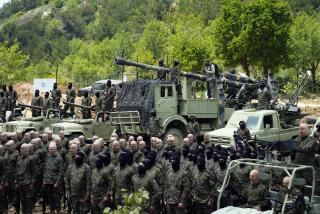Arab League Force for Lebanon Debated : Controversial Plan to Replace Syrian Units Aired at Summit
- Share via
CASABLANCA, Morocco — Arab leaders, heading toward what promised to be a major confrontation between moderate and hard-line states, debated a proposal Wednesday to form an Arab League peacekeeping force to replace Syrian forces in Lebanon.
The proposal was circulated by Jordan, over strong Syrian protests, during a series of bilateral meetings here on the second day of an emergency Arab League summit called to discuss the Lebanese crisis and the Palestinian question.
The Palestinian issue, which was the subject of a heated debate during pre-summit meetings by Arab League foreign ministers, appeared to have been artfully handled by an Egyptian-authored compromise resolution. The resolution expresses the summit’s support for Palestine Liberation Organization Chairman Yasser Arafat’s political initiative without explicitly endorsing some of the more controversial concessions he has made over the past six months.
But Lebanon remained the summit’s most divisive issue--the one with which an increasingly confident coalition of moderate Arab states, reinforced by Egypt’s return to Arab ranks, was trying to put Syria and its radical allies on the defensive.
The moderates, led by Egypt and Iraq, are “trying to pull the rug out from under Syria in Lebanon,” one conference source said. “The Syrians are furious about it, but they can’t really do anything now that the weight of Egypt is back in the Arab fold.”
Place in History
Even if it does nothing else--and, in the struggle to achieve a consensus, there is still a strong possibility that it will end up doing little, if anything, about Lebanon--this summit “has already earned its place in Arab history by restoring Egypt to full membership in the Arab League,” one senior Arab diplomat said.
Although most analysts do not expect Egypt to dominate Arab ranks the way it did 10 years ago, before its membership in the Arab League was suspended for signing a peace treaty with Israel, Cairo’s return to Arab councils adds significant weight to what is being described as a new moderate axis also grouping Jordan, Iraq and, to a lesser extent, the conservative but politically timid states of the Persian Gulf.
“No one country can dominate the region any longer. It is a trio now--Egypt, Iraq and Syria,” the senior diplomat said.
Covertly Capitulating
Still, the effect of Egypt’s weight on the Iraqi side of this regional scale of power is already making itself felt at the summit.
After covertly capitulating on the issue of Egypt’s readmittance to the Arab League, Syria was forced to accept the Egyptian compromise on the Palestinian resolution to be adopted at the summit.
At the same time, it is also being forced, largely at Iraqi-Egyptian insistence, to fight a defensive battle over the question of its military presence in Lebanon.
Delivering the keynote address Tuesday night to the opening session of the summit at Casablanca’s opulent Royal Palace, Egyptian President Hosni Mubarak threw down the gauntlet to the Syrians by calling for the withdrawal of “all foreign forces” from Lebanon. He urged his fellow Arabs to act decisively “before the fire takes away from our hands all possible elements of stability.”
After what was originally a suggestion by Iraq, a proposal to send a small Arab League observer force to Lebanon was expanded into a discussion about dispatching a full peacekeeping force that would be likely to include a large contingent of Egyptian troops, according to summit participants.
The main purpose of the force, whose size and composition have yet to be decided, would be to oversee the implementation of a four-point peace plan for Lebanon drafted in preparatory talks by Arab League foreign ministers earlier this week, conference sources said.
The four points of the plan, contained in a ministerial committee report to be debated at the summit, include:
-- Consolidating a cease-fire to halt the vicious artillery duels between Christian Lebanese forces and Syrian troops that have ravaged Beirut for two months.
-- Convening the Lebanese Parliament to elect a new president for the divided country.
-- Instituting political reforms to which the new president, required by the constitution to be a Christian, would be committed. While the reforms have yet to be spelled out, the Arab League plan envisions a stronger role for Lebanon’s Muslim premier.
-- Strengthening the authority of the Lebanese Parliament by giving it the power to override the president’s veto of any Cabinet ministers chosen by the prime minister.
Under the proposal for a peacekeeping force, Syria’s 45,000 soldiers in Lebanon also would be gradually withdrawn.
Because this would dramatically diminish Syria’s role in Lebanon--a role that has given it wide regional influence--it is highly improbable that Syrian President Hafez Assad will agree to it.
The resolution on Lebanon to be adopted by the summit “will try to consolidate the Arab League role there--but, of course, there will also have to be a face-saving formula for Syria,” another conference source said.
More to Read
Sign up for Essential California
The most important California stories and recommendations in your inbox every morning.
You may occasionally receive promotional content from the Los Angeles Times.













